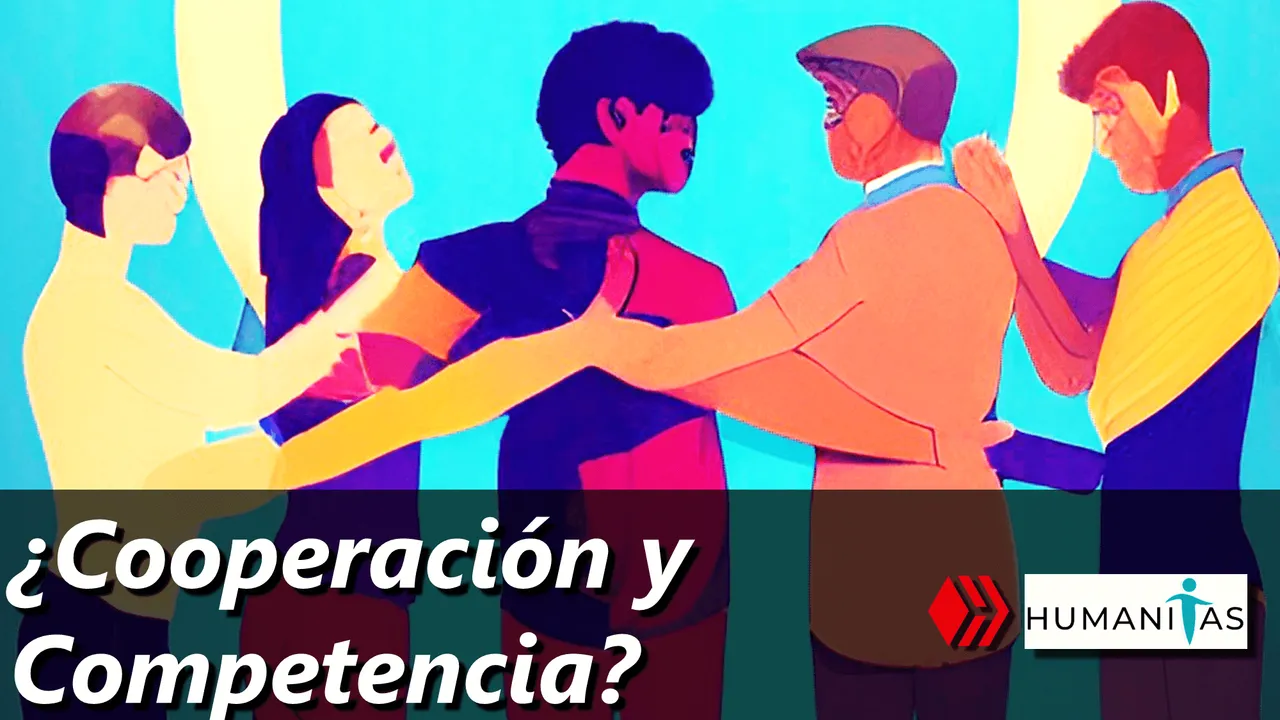Cuando se habla de la sociedad moderna y de sus problemas en general, se suele mencionar a la competencia feroz como uno de los principales causantes de pobreza, desigualdad, entre otras cosas. Creo que todos podemos estar de acuerdo en que siempre o casi siempre es mejor cooperar que competir con otros seres humanos, y que un entorno de extrema competencia puede ser un entorno inhumano, en donde, literalmente, se lucha por sobrevivir, incluso con consecuencias físicas y psicológicas para cualquiera.

Sin embargo, vamos a tratar de encontrar el lado humano o el lado sano de la competencia, y de cómo se complementa perfectamente con la cooperación.
El libre mercado, más allá de cualquier ideología, es un mecanismo tanto alabado como odiado, y es que me parece que es uno de esos conceptos que tiene "doble filo". A mi parecer, es como cualquier tecnología humana, si se usa o aplica bien nos traerá grandes beneficios. Si se aplica mal, o a medias, traerá problemas y distorsiones, por lo que parecerá que es malo y que debe ser sustituido por otro sistema.
Traigo esto a colación ya que normalmente asociamos la competencia con el mercado, la libertad de las empresas para explotar, la "mano invisible", etc. Y todo esto tendría también algo que ver con nuestras creencias como sociedad, lo que nos enseñan en familia y en la escuela respecto a ser "competitivos". Pero, con el tiempo, caemos en cuenta que cooperar es realmente lo más importante, lo cual nos puede inclinar a pensar que competir es de alguna forma malo y, por lo tanto, el libre mercado es en esencia, malo.
En frente de todo esto, empieza obviamente a surgir un estigma negativo frente al concepto de competir y se da fuerza al concepto de cooperación. Cuando vemos ciertos casos de éxito en el mundo, tenemos, por ejemplo, la educación de los países nórdicos. Allí se pone mucho énfasis en la cooperación entre estudiantes.
No sé que decir acerca de la educación en países como Japón o Corea, la cual no deja de ser de calidad pero claramente podemos ver que puede traer consecuencias psicológicas negativas a los estudiantes debido a la alta competitividad. Me parece que el tema del equilibrio entre la competencia y la cooperación depende mucho también de la cultura de cada sociedad.
Y entonces ¿Cómo se complementan la cooperación y la competencia? Imaginemos una empresa con 100 integrantes en total. Estas 100 personas están, o deberían estar, cooperando entre sí. Más allá de cualquier ambición personal que impulse a competir con un compañero de trabajo, si no existe cooperación entre esos 100 no habrá crecimiento o éxito en la empresa.
En realidad, ningún ser humano debería competir con otro ser humano. Las empresas compiten entre sí, pero no se trata de una lucha directa, sino indirecta. Ninguna empresa tiene como objetivo "competir", literalmente.
En una sociedad ideal, en donde existe el libre mercado, tendríamos la libertad de elegir con quien cooperar o no. Es decir, la cooperación siempre es una base de cualquier sociedad, más allá de la ideología. Cooperar suele traer, obviamente, beneficios, como resultado de trabajar en equipo.
Es decir, es de nuestro interés buscar con quien cooperar para que todas las partes ganen algo, y que, previamente, todos estén de acuerdo.
Creo que todos podemos estar de acuerdo que la cooperación es buena. Pero, luego nos damos cuenta que no es posible cooperar con todo el mundo a la vez. Cuando eliges comprar un producto en lugar de otro, estás eligiendo cooperar con un grupo de humanos (empresa "A"), por sobre otro grupo de humanos (empresa "B").

La idea sería entonces, competir para cooperar, cooperar para competir. Todos quieren contratar al mejor jugador de fútbol, pero este solo puede cooperar con un equipo a la vez, entonces, varios equipos compiten entre sí para poder cooperar con él. Obviamente, el dinero será un factor decisivo para que ese jugador elija un equipo u otro, pero eso es otro tema...
Cuando lo vemos de esta manera, no existe realmente una competencia pura y dura entre seres humanos por sobrevivir, sino una competencia para cooperar. Las empresas compiten entre sí para cooperar con el mayor público posible.
Así todo suena muy bonito, pero en la realidad existen diversas problemáticas y diferentes factores que impiden una cooperación realmente funcional entre humanos, lo cual lleva a problemas sociales. También depende mucho de la cultura y costumbres de cada sociedad. También se relaciona mucho con la confianza entre habitantes, algo que mencionamos en una anterior publicación.
La competencia puede ser positiva en ciertos aspectos, ya que, como forma parte de nuestros instintos primitivos, nos permite buscar mejorar en algo, pero, en última instancia, con quien realmente competimos todo el tiempo es con nosotros mismos por mejorar. Ahora, pienso que cuando en una sociedad no hay un equilibrio sano entre competencia y cooperación pueden surgir problemáticas sociales, que no necesariamente son el resultado de la competitividad del libre mercado.
La competencia ocurre, por decirlo de alguna forma, automática o naturalmente. Por ello, creo que lo ideal sería enfocar la educación y el aprendizaje hacia cómo cooperar mejor con otras personas. La evolución en la naturaleza no es únicamente competencia, animales y plantas cooperan, aunque lo hagan inconscientemente. Es más, podría decirse que "la supervivencia del más fuerte" es una idea que la ciencia parece haber dejado atrás hace mucho tiempo.
Bueno, esta ha sido toda mi reflexión por ahora acerca del tema de la competencia y la cooperación. Gracias por visitar este blog... ¡Hasta la próxima!

When talking about modern society and its problems in general, fierce competition is often mentioned as one of the main causes of poverty, inequality, among other things. I think we can all agree that it is always or almost always better to cooperate than to compete with other human beings, and that an environment of extreme competition can be an inhumane environment, where one literally fights for survival, even with physical and psychological consequences for anyone.

However, let's try to find the human side or the healthy side of competition, and how it perfectly complements cooperation.
The free market, beyond any ideology, is a mechanism both praised and hated, and it seems to me that it is one of those concepts that has a "double edge". In my opinion, it is like any human technology, if it is used or applied well, it will bring us great benefits. If it is applied badly, or half-heartedly, it will bring problems and distortions, so it will seem that it is bad and should be replaced by another system.
I bring this up since we normally associate competition with the market, the freedom of companies to exploit, the "invisible hand", etc. And all this would also have something to do with our beliefs as a society, what we are taught in family and school about being "competitive". But, over time, we realize that cooperating is really the most important thing, which may incline us to think that competing is somehow bad and, therefore, the free market is, in essence, bad.
In the face of all this, there obviously starts to emerge a negative stigma against the concept of competing and the concept of cooperation is given strength. When we look at certain success stories in the world, we have, for example, education in the Nordic countries. There, a lot of emphasis is put on cooperation among students.
I don't know what to say about education in countries like Japan or Korea, which is not without quality but clearly we can see that it can bring negative psychological consequences to students due to high competitiveness. It seems to me that the issue of the balance between competition and cooperation also depends a lot on the culture of each society.
And then How do cooperation and competition complement each other? Let's imagine a company with 100 members in total. These 100 people are, or should be, cooperating with each other. Beyond any personal ambition to compete with a co-worker, if there is no cooperation among those 100 there will be no growth or success in the company.
In reality, no human being should compete with another human being. Companies compete with each other, but it is not a direct struggle, but an indirect one. No company's goal is to "compete", literally.
In an ideal society, where there is a free market, we would have the freedom to choose with whom to cooperate or not. In other words, cooperation is always a basis of any society, regardless of ideology. Cooperating obviously tends to bring benefits, as a result of working as a team.
That is to say, it is in our interest to seek with whom to cooperate so that all parties gain something, and that, previously, everyone agrees.
I think we can all agree that cooperation is good. But, then we realize that it is not possible to cooperate with everyone at the same time. When you choose to buy one product over another, you are choosing to cooperate with one group of humans (company "A") over another group of humans (company "B").

The idea would then be, compete to cooperate, cooperate to compete. Everyone wants to hire the best soccer player, but he can only cooperate with one team at a time, so several teams compete with each other in order to cooperate with him. Obviously, money will be a deciding factor for that player to choose one team or another, but that's another topic....
When we look at it this way, there is not really a pure competition between human beings to survive, but a competition to cooperate. Companies compete with each other to cooperate with the largest possible audience.
So it all sounds very nice, but in reality there are various problems and different factors that prevent a really functional cooperation between humans, which leads to social problems. It also depends a lot on the culture and customs of each society. It is also very much related to trust between inhabitants, something we mentioned in a previous post.
Competition can be positive in certain aspects, since, as it is part of our primitive instincts, it allows us to seek to improve in something, but, ultimately, who we are really competing with all the time is ourselves to improve. Now, I think that when there is not a healthy balance between competition and cooperation in a society, social problems can arise, which are not necessarily the result of free market competitiveness.
Competition occurs, so to speak, automatically or naturally. Therefore, I think the ideal would be to focus education and learning on how to cooperate better with other people. Evolution in nature is not only about competition, animals and plants cooperate, even if they do so unconsciously. Moreover, it could be said that "survival of the fittest" is an idea that science seems to have left behind long ago.
Well, this has been all my thoughts for now on the topic of competition and cooperation. Thanks for visiting this blog... See you next time!
Translated to English language with the help of DeepL.com
Otras redes sociales:
 |
 |
 |
F1 & motorsports: @acontmotor
Secondary blog: @acontblog

| ¡Gracias por visitar! — ¡Thanks for visiting!  |